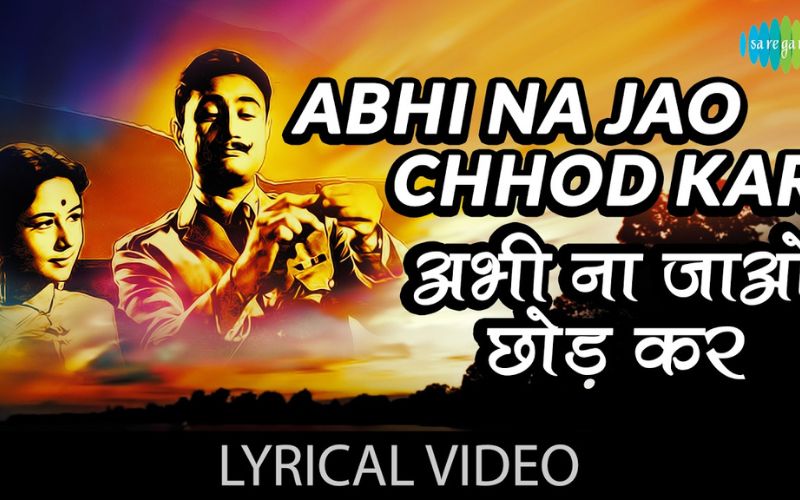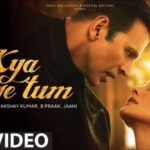Mohammed Rafi, the legendary playback singer of the Indian film industry, is known for his versatile and soulful voice that has mesmerized generations of music lovers. Born in 1924 in Kotla Sultan Singh, Punjab (now in Pakistan), Rafi’s musical journey began at a young age, and he went on to become one of the most celebrated and influential voices in the history of Indian cinema.
Rafi’s career spanned over four decades, during which he lent his voice to countless hit songs, collaborating with some of the most renowned composers and lyricists of his time. His ability to effortlessly adapt to various genres, from romantic ballads to patriotic anthems, earned him the title of “The Voice of Bollywood.” Rafi’s legacy continues to inspire and influence countless musicians and fans alike, making him an integral part of India’s rich musical heritage.
Overview of the song “Abhi Na Jao Chhod Kar”
One of the most iconic and beloved songs in Rafi’s vast repertoire is “Abhi Na Jao Chhod Kar” from the 1961 film “Hum Dono.” The song, composed by the legendary duo Sachin Dev Burman (S.D. Burman) and written by the acclaimed lyricist Sahir Ludhianvi, has become a timeless classic, resonating with audiences across generations.
The song’s enchanting melody, coupled with Rafi’s emotive and soulful rendition, has made it a staple in the canon of Indian music. “Abhi Na Jao Chhod Kar” has become a beloved anthem for romantics, capturing the essence of longing, separation, and the bittersweet nature of love.
Meaning and interpretation of the lyrics
The lyrics of “Abhi Na Jao Chhod Kar” are a poetic exploration of the emotions experienced during the fragile moments of a relationship. The title itself, “Abhi Na Jao Chhod Kar,” translates to “Don’t leave me yet,” conveying the protagonist’s plea to their beloved to stay a little longer before departing.
The lyrics delve into the universal themes of love, loss, and the fear of separation. The protagonist expresses their desire to hold onto the fleeting moments of togetherness, knowing that the inevitable parting is looming. The lyrics evoke a sense of vulnerability and the bittersweet reality of love, where the beauty of the present is tinged with the melancholy of the future.
Through the use of vivid imagery and poetic devices, the lyrics of “Abhi Na Jao Chhod Kar” resonate with the audience, capturing the essence of the human experience in matters of the heart.
Musical composition and arrangement
The musical composition of “Abhi Na Jao Chhod Kar” is a testament to the genius of the legendary composer S.D. Burman. The song’s melody is a perfect blend of simplicity and complexity, with a captivating rhythm that seamlessly complements the emotive lyrics.
The arrangement features a delicate interplay of instruments, including the sitar, sarod, and tabla, which create a mesmerizing and atmospheric soundscape. The subtle orchestral accompaniment, with its swelling strings and gentle harmonies, adds depth and richness to the overall musical experience.
The song’s structure is carefully crafted, with the verses building up to a powerful and memorable chorus that lingers in the listener’s mind long after the song has ended. The musical arrangement, combined with Rafi’s emotive and nuanced vocal performance, elevates the song to a level of pure artistic excellence.
Popular renditions and collaborations
“Abhi Na Jao Chhod Kar” has been a beloved song for generations, and it has inspired numerous renditions and collaborations over the years. The original version, featuring Mohammed Rafi’s captivating vocals, remains the definitive and most iconic interpretation of the song.
However, the song has also been covered by various artists, each bringing their own unique interpretation and style to the classic. One notable collaboration is the duet version featuring Rafi and the legendary Lata Mangeshkar, which showcases the incredible vocal chemistry and harmony between the two iconic singers.
Additionally, the song has been included in various film soundtracks, TV shows, and live performances, further solidifying its place in the hearts of music lovers worldwide. These diverse interpretations and collaborations have helped to keep the legacy of “Abhi Na Jao Chhod Kar” alive, ensuring that it continues to captivate and inspire audiences for generations to come.
Impact and legacy of the song
“Abhi Na Jao Chhod Kar” has become a timeless classic that has transcended the boundaries of Indian cinema and music. The song’s enduring popularity and impact can be attributed to its universal appeal, emotional depth, and the sheer brilliance of its musical and lyrical composition.
The song’s legacy extends far beyond its initial release, as it has become a staple in the repertoire of countless musicians and performers. It has been featured in various cultural events, festivals, and celebrations, serving as a unifying force that brings people together through the power of music.
Moreover, “Abhi Na Jao Chhod Kar” has inspired countless artists and musicians, who have drawn inspiration from its melodic beauty and poetic lyricism. The song’s influence can be seen in the work of subsequent generations of musicians, who have sought to emulate the timeless essence of this iconic track.
The enduring legacy of “Abhi Na Jao Chhod Kar” is a testament to the enduring power of great art and the lasting impact that a single song can have on the hearts and minds of people worldwide.
Translating the lyrics in English
Here is the English translation of the lyrics of “Abhi Na Jao Chhod Kar”:
Verse 1: Don’t leave me yet, my love, The night is still young, and the moon shines bright. The breeze whispers in our ears, Urging us to stay a little longer.
Chorus: Don’t leave me yet, my love, The night is still young, and the moon shines bright. The breeze whispers in our ears, Urging us to stay a little longer.
Verse 2: The world outside waits for us, But let’s hold on to this moment a little while. The stars twinkle in the sky, Bidding us to remain in each other’s arms.
Chorus: Don’t leave me yet, my love, The night is still young, and the moon shines bright. The breeze whispers in our ears, Urging us to stay a little longer.
Verse 3: The flowers bloom in the garden, Inviting us to bask in their fragrance. The birds sing their sweet melodies, Echoing the rhythm of our hearts.
Chorus: Don’t leave me yet, my love, The night is still young, and the moon shines bright. The breeze whispers in our ears, Urging us to stay a little longer.
The English translation captures the essence of the original Hindi lyrics, conveying the protagonist’s heartfelt plea to their beloved to remain by their side, even as the night draws to a close.
Interesting facts and trivia about the song
- Iconic Collaboration: “Abhi Na Jao Chhod Kar” was a collaboration between the legendary composer S.D. Burman and the acclaimed lyricist Sahir Ludhianvi, two of the most influential figures in the history of Indian music.
- Musical Inspiration: The melody of “Abhi Na Jao Chhod Kar” is said to be inspired by the traditional Punjabi folk song “Mera Laung Gawacha,” which was popularized by the renowned singer Noor Jehan.
- Playback Perfection: Mohammed Rafi’s rendition of “Abhi Na Jao Chhod Kar” is widely regarded as one of the most iconic and definitive playback performances in the history of Indian cinema.
- Duet Delight: The duet version of “Abhi Na Jao Chhod Kar,” featuring Rafi and Lata Mangeshkar, is considered a masterclass in vocal harmony and is a cherished recording in the annals of Indian music.
- Film Significance: The song was featured in the 1961 Hindi film “Hum Dono,” starring Dev Anand and Sadhana, and played a crucial role in the film’s success and cultural impact.
- Enduring Legacy: “Abhi Na Jao Chhod Kar” has been covered and reinterpreted by numerous artists over the years, showcasing its timeless appeal and the profound impact it has had on the Indian music landscape.
- Rafi’s Versatility: The song’s success further cemented Mohammed Rafi’s reputation as a versatile and accomplished playback singer, capable of delivering emotionally charged and nuanced performances.
These fascinating facts and trivia surrounding “Abhi Na Jao Chhod Kar” serve as a testament to the song’s enduring legacy and the profound impact it has had on Indian music and cinema.
Conclusion
The legacy of Mohammed Rafi’s “Abhi Na Jao Chhod Kar” is a testament to the enduring power of great art and the timeless appeal of heartfelt, emotive music. The song’s poetic lyrics, captivating melody, and Rafi’s soulful rendition have captivated audiences for generations, transcending the boundaries of Indian cinema and music.
Through its universal themes of love, loss, and the bittersweet nature of human relationships, “Abhi Na Jao Chhod Kar” has become a cherished classic that continues to resonate with listeners worldwide. The song’s enduring popularity and impact are a reflection of the profound artistry and emotional depth that defined Mohammed Rafi’s illustrious career.
As we bid farewell to this timeless masterpiece, we are left with a deep appreciation for the enduring legacy of Mohammed Rafi and the indelible mark he has left on the world of Indian music. “Abhi Na Jao Chhod Kar” stands as a testament to the power of music to capture the essence of the human experience, and it will continue to inspire and captivate audiences for generations to come.
If you’re a fan of Mohammed Rafi and Indian music, be sure to check out our other articles exploring the rich history and cultural significance of this beloved genre. From in-depth analyses of iconic songs to profiles of legendary artists, we have a wealth of content to satisfy your musical curiosity. Don’t miss out on the opportunity to dive deeper into the world of Indian music and discover new treasures to add to your listening repertoire.



